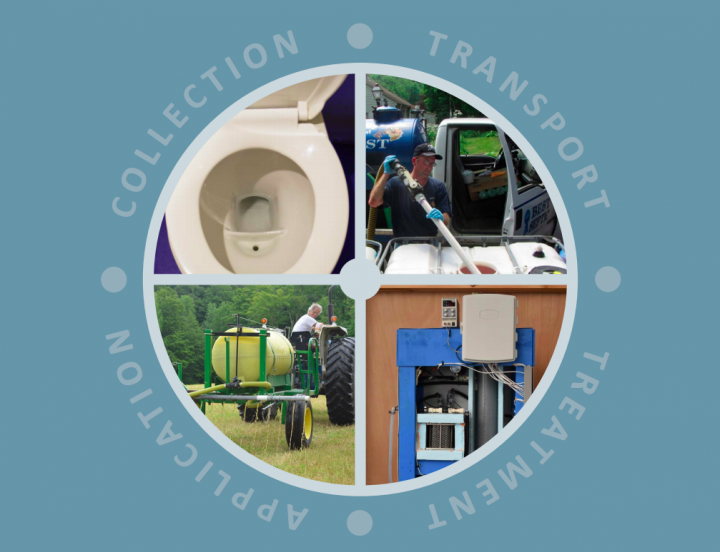Guide to Starting a Community-Scale Urine Diversion Program
Atlee, J., Noe-Hays, A., Nace, K., Schreiber, T., Davis, A., Lally, C., Dotson, S. (2019)

Published in: 2019
Pages: 55
Publisher:
Rich Earth Institute, Brattleboro, VT, USA
Author:
Atlee, J., Noe-Hays, A., Nace, K., Schreiber, T., Davis, A., Lally, C., Dotson, S.
Uploaded by:
SuSanA secretariat
Partner profile:
Rich Earth Institute
2074 Views
123 Downloads
Location of library entry
The Rich Earth Institute’s Urine Nutrient Reclamation Program (UNRP) is the first community-scale urine diversion program (UD program) in the United States. Initiated in 2012, we now divert thousands of gallons of urine from the wastewater stream annually. We recycle the urine into sanitized fertilizer and apply it to hay fields on participating farms in Windham County, Vermont. Demand for urine fertilizer among participating farmers is currently higher than the available supply. This ongoing program prevents water pollution, conserves drinking water, and produces fertilizer for local farms. At the same time we are providing a research platform for academic partners across the country, developing tools and technologies for handling and processing urine, and working closely with farmers to integrate urine-derived fertilizers into their operations. As we continue to refine our approach, our program serves as an example for communities considering their own urine diversion program, and creates a precedent for others to replicate and expand on our work.
This document describes the work of the Rich Earth Institute (Rich Earth) in detail, primarily to support those seeking to move this work forward in their own regions. We cover the process of starting up a community-scale urine diversion program (UD program) and key elements of its operation. These include technical details for processes and equipment, regulatory and economic considerations, and the human factors that come into play—including effective education and community outreach and building relationships with farmers. Throughout the document we also reference the UD program Toolkit, where we have publicly made available a host of open source documents, presentations, and other materials to support those starting a UD program. Please do let us know if you start a UD program! We’d love to hear what happens, and assist if we can.
This document assumes familiarity with the rationale for urine diversion: that separation of nutrient-rich urine at the source keeps these nutrients from causing water pollution, allows them to be used as an agricultural resource, and conserves potable water. It also has the potential to be a highly cost-effective approach to meeting national
requirements for reducing the nutrient load in water bodies across the U.S., alongside or as an alternative to conventional septic tanks and wastewater treatment methods. The subsections below cover some of the most important points to understand and share with others about urine diversion.
Bibliographic information
Atlee, J., Noe-Hays, A., Nace, K., Schreiber, T., Davis, A., Lally, C., Dotson, S. (2019). Guide to Starting a Community-Scale Urine Diversion Program. Rich Earth Institute, Brattleboro, VT, USA
Filter tags
Case studies in other formats Composting, vermicomposting (solid waste), composting toilets Container based systems (CBS) English Fertiliser Guidelines and manuals North America Practitioners Urine Urine diversion dehydration toilets (UDDTs) Water (irrigation, process, other)














